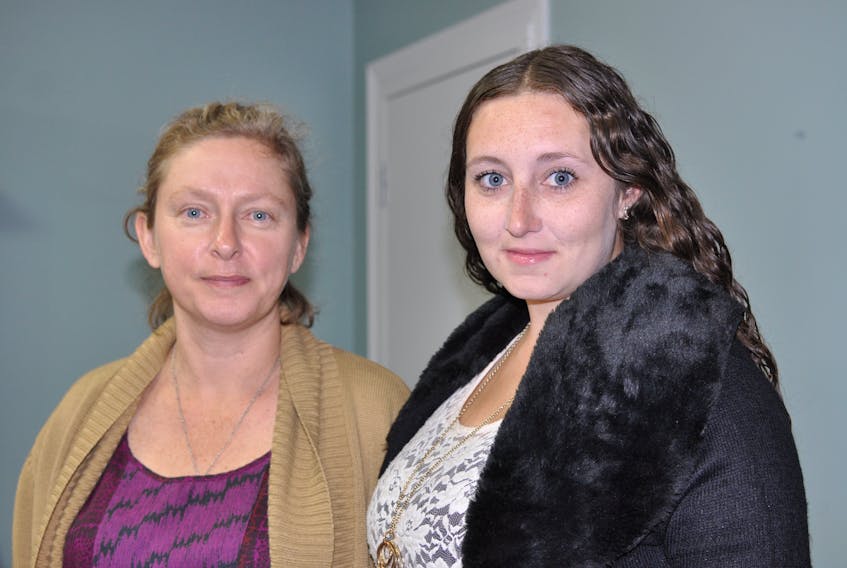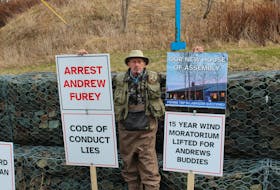Tanya McFadyen works with a lot of different women as the manager of Vesta Place, the Corner Brook Women's Centre second stage housing facility.
She's not interested with pushing papers or programs on the people she works with. Instead she wants to connect with people.
She does that by telling them her own story as a way to build a relationship.
Her story includes substantial experience with addictions.
She doesn't like to use the term addict to describe herself or others with addictions, because that describes one thing.
"I'm much more than one thing," she said.
She also aims to broaden the term addiction, whether it's from alcohol and drugs to coffee and shopping.
"Anything that gets in the way of your relationships with others, your ability to feel healthy in your mind and your body, that's an addiction."
When McFadyen and former Vesta Place resident Jackie O'Connell started talking they were connected through their addictions.
As the two talked they realized there wasn't much in the way of opportunities in this area for woman to connect and share their experiences. That's when they decided to start a Narcotics Anonymous group for women. The group meets every Tuesday from 1-2 p.m. at the Women’s Centre at 2 Carmen Ave.
As facilitators McFadyen and O'Connell have agreed to use their names in this story but ensure anyone who may attend the group that their identities would remain anonymous.
McFadyen said what got her through was the connections she made with other people with addictions, and the support network she built.
"Meetings and connecting and talking about that experience keeps us on the road to recovery," said McFadyen. "There's a common language you share."
She wants to give that to other women and without the judgment she knows occurs.
The road to recovery
McFadyen was 21 when her journey with addiction really started, though she took her first drink at 14.
"I'd always had an allure to alcohol," she said.
The now 45-year-old was living on the east side of Vancouver.
She was born and raised in an addictions-led family. Her dad was a recovering alcoholic but a using addict, and drinking alcohol and smoking weed had always been a part of her life and normalized.
Living on her own, alcohol and weed became her go to. If she was stressed about rent, work, was lonely or feeling the effects of the trauma in her life she used to numb that.
Eventually her drug use went up a level to cocaine and psychedelics.
"It got to the point where I realized that I was taking the harder drugs, the drugs that make you really paranoid, the drugs that make you sweat, the drugs that make you feel dizzy and nauseous and sick, the drugs that stop you from eating, the drugs that want you to go higher and higher in your experience."
She was getting into risky situations just to find drugs and would wake up not remembering what had happened. That caused depression, but the drug use continued. She lost jobs because she went to work high and lost her apartment.
"What hit me hard is when I got pregnant," she said. "Then I had to get sober."
She did not want her child to see and experience what she did.
"You know what it's like to be that kid."
That's why she believes it's important to help parents and not judge them. The woman who now holds a PhD in education and who taught at a university wants people to realize it can happen to anyone.
Recovery was hard and there were times as she went through withdrawal that she thought she was going to die.
She reached out to a women's clinic and got help with building her self-esteem and to get food and vitamins and gradually turned her life around.
"I've been on the road 17-18 years," she said, adding there have been slipups. "But what's gotten me through is other people who've experienced addiction."
Jackie's story
Jackie O'Connell also witnesses a lot of addictions in her extended family.
She said her father is a recovering alcoholic. He got sober before she was born, but the family split up when she was very young and her dad moved to Ontario.
"I think that was where my negative feelings started to come it," said the 30-year-old.
She felt out of place and says she was later sexually assaulted.
To deal with her feelings and the trauma she experienced, she turned to drugs and started smoking weed in school. Then came the drinking.
She recalls taking a family member's Ritalin and learning prescription drugs could provide a good high.
"So that's when the pills started," she said.
She got into trouble and was in and out of open and closed custody facilities and foster care.
At 16, when she was old enough to do what she wanted, she moved to Ontario to live with her father.
That's where she found the "real drugs."
Things only compounded with her self-esteem issues and she sought out relationships with men who could provide the drugs and who would party with her.
She lived with her father, who tried to help her and encouraged her to get clean, and with others and on her own.
Her dad introduced her to meetings, but O'Connell said he knew she had to want to go for herself, not because he pushed her to.
"My dad said sometimes you've got to fake it till you make it. If you're in that chair one day you're going to hear something. There might be a lot of meetings that you'll sit there and you don't hear one thing, but one of these days it's going to click."
She was pregnant when she was 19 and together, with her child's father, got on a methadone program.
She thought of returning home to Corner Brook but didn't want to go home the way she left.
She wanted to be better, but was reminded by family here that there was no methadone available at the time.
She felt stuck where she was in Scarborough with dealers everywhere.
"Being around the methadone clinic I think kept me entangled in the drug culture," she said.
Things got better when she got a good job and a nice apartment. She felt proud. But then she had access to money and didn't need others to get drugs for her.
"That's when my addiction took its turn for the worse."
She went from uppers to downers. When her daughter was two she sent her home with her grandmother and then decided she wanted to get better to get her back.
She tried detox and rehab, but the sincerity wasn't there; she only did it on the promise she could go home again.
Without the responsibility of being a mom it was go time again. Then came the hard drugs, opioids, Oxycodone and Fentanyl.
Eventually, she found the supports she needed and has been on methadone for 10 years.
"It works for me," she said.
She's made a couple of attempts to get off of it, but they've been premature.
"I've never really been successful without it yet - the key word is yet."
There's been slips, but she's been clean for about five years.
Her resolve to stay clean comes from spite, to show those who doubted her that she could do it, and to be reunited with her daughter.
"I will not fail."
She wants to be able to share what she knows with others to help them along.
"Helping other people helps me," she said.
"I'm going to give something back in the world, and whatever it is it's going to be great."
Edited to add meeting time









